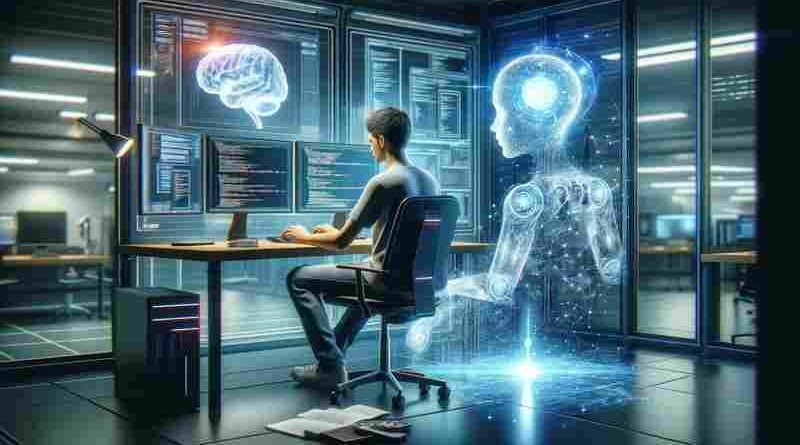World of Devin, the AI Software Engineer
In the rapidly evolving landscape of technology, the emergence of artificial intelligence (AI) has revolutionized countless industries, introducing efficiencies and capabilities previously unimaginable. At the forefront of this transformation is a unique and groundbreaking development: Devin, the AI software engineer. This article explores the intricacies of Devin, its impact on the tech industry, and how it’s shaping the future of software development.
Table of Contents
ToggleIntroduction to Devin, the AI Software Engineer
Devin is not just another AI; it represents a leap forward in software engineering. Engineered with the latest advancements in machine learning and artificial intelligence, Devin can understand, modify, and create code, effectively functioning as a software engineer. This capability marks a significant milestone in AI development, as it transcends the traditional boundaries of AI tasks.
How Devin Works
At the heart of Devin’s functionality is a sophisticated blend of machine learning models, including deep learning and natural language processing (NLP). These models enable Devin to comprehend complex software engineering tasks, interpret programming languages, and engage with software development projects with an understanding akin to that of human engineers.
- Deep Learning: Devin utilizes deep learning algorithms to analyze and generate code. These algorithms are trained on vast datasets of source code, allowing Devin to learn coding patterns, styles, and best practices.
- Natural Language Processing (NLP): NLP capabilities allow Devin to understand and generate human-like text, enabling it to interpret project requirements, write documentation, and communicate with human team members efficiently.
- Reinforcement Learning: Through reinforcement learning, Devin improves its coding skills over time, learning from past projects to enhance its performance on future tasks.
Applications of Devin in Software Development
Devin’s versatility and advanced capabilities open up a wide array of applications in software development:
- Automated Coding: Devin can automate routine coding tasks, significantly reducing development time and freeing human engineers to focus on more complex problems.
- Code Review and Quality Assurance: It can review code for errors, adherence to coding standards, and security vulnerabilities, ensuring high-quality outputs.
- Custom Software Solutions: Devin can contribute to building custom software solutions, adapting to different programming languages and project requirements with ease.
- Collaboration and Training: As an AI team member, Devin can collaborate with human engineers, providing insights and suggestions. It can also serve as a training tool for junior developers, helping them improve their coding skills.
Impact on the Tech Industry
The introduction of Devin into the software engineering landscape has profound implications for the tech industry:
- Increased Efficiency: By automating routine tasks, Devin significantly speeds up the development process, enabling faster time-to-market for software products.
- Enhanced Quality: Devin’s ability to review and improve code can lead to higher-quality software, reducing bugs and security issues.
- Innovation Acceleration: Freeing human engineers from mundane tasks allows more time for innovation and creative problem-solving, pushing the boundaries of what’s possible in software development.
- Democratization of Development: Devin lowers the barrier to software development, making it more accessible to individuals and organizations without extensive coding expertise.
Challenges and Ethical Considerations
Despite its potential, the integration of AI like Devin into software engineering poses challenges and ethical considerations:
- Job Displacement: The automation of coding tasks raises concerns about job displacement for software engineers.
- Bias and Fairness: AI systems can perpetuate biases present in their training data, necessitating careful oversight to ensure fairness and inclusivity.
- Security Risks: The use of AI in software development introduces new security vulnerabilities, requiring robust security measures to protect against AI-specific threats.
The Future of Devin and AI in Software Engineering
Looking ahead, Devin and similar AI technologies are set to become integral to the software development process. Ongoing advancements in AI research will further enhance their capabilities, potentially enabling fully autonomous software development. However, the success of this integration will depend on addressing ethical and practical challenges, ensuring that AI enhances rather than undermines the software engineering profession.
Devin, the AI software engineer, represents a significant step forward in the fusion of AI and software development. By automating tasks, improving quality, and accelerating innovation, Devin has the potential to transform the tech industry. However, realizing this potential requires careful navigation of the challenges and ethical considerations associated with AI. As we stand on the brink of a new era in technology, the evolution of AI like Devin will undoubtedly play a pivotal role in shaping the future of software engineering.
This exploration of Devin offers a glimpse into a future where AI and human creativity converge, heralding a new chapter in the story of technological advancement. As we move forward, the collaboration between human engineers and AI counterparts like Devin will be crucial in driving innovation and achieving new heights in software development.

